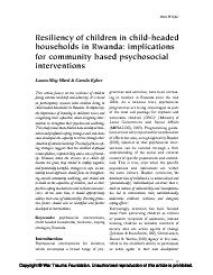Resiliency of children in child-headed households in Rwanda: implications for community based psychosocial interventions
This article focuses on the resilience of children facing extreme hardship and adversity. It is based on participatory research with children living in child headed households in Rwanda. It emphasizes the importance of listening to children’s voices and recognizing their capacities when designing interventions to strengthen their psychosocial wellbeing. This studyshows that children have developed innovative and profitable coping strategies and some have even developed the capacity to thrive through their situation of extreme hardship. The study of these coping strategies suggests that the children displayed resourcefulness, responsibility, and a sense of morality. However, when the stressors in a child’s life became too great, they tended to employ negative, and potentially harmful, strategies to cope. A community based approach should focus on strengthening overall community wellbeing, and should aim to build on the capacities of children, such as their positive coping mechanisms and resilient characteristics. At the same time, it should appropriately address their areas of vulnerability. Existing protective factors should also be identified and further developed in interventions.
Geachte bezoeker,
De informatie die u nu opvraagt, kan door psychotraumanet niet aan u worden getoond. Dit kan verschillende redenen hebben,
waarvan (bescherming van het) auteursrecht de meeste voorkomende is. Wanneer het mogelijk is om u door te verwijzen naar de bron
van deze informatie, dan ziet u hier onder een link naar die plek.
Als er geen link staat, kunt u contact opnemen met de bibliotheek,
die u verder op weg kan helpen.
Met vriendelijke groet,
Het psychotraumanet-team.
Reference:
Laura May Ward, Carola Eyber | 2009
In: Intervention: the international journal of mental health, psychosocial work and counselling in areas of armed conflict, ISSN 1571-8883 | 7 | 1 | 17-33
http://www.interventionjournal.com/sites/default/files/7.1.%20Ward%20%26%20Eyber.pdf
In: Intervention: the international journal of mental health, psychosocial work and counselling in areas of armed conflict, ISSN 1571-8883 | 7 | 1 | 17-33
http://www.interventionjournal.com/sites/default/files/7.1.%20Ward%20%26%20Eyber.pdf


